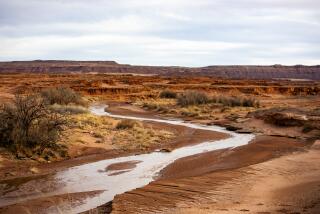Tribes, small-town residents fear Oklahoma City will drain their lake
- Share via
Over at the Sardis Lakeview Cafe, where the sign assures all “hillbillies and outlaws” welcome, folks can’t help but worry about losing the lake.
With water scarce in western drought-dry Oklahoma and neighboring Texas, cities are trying to tap the lake in Southeast Oklahoma, a region dubbed “Little Dixie” due to an influx of Southern settlers after the Civil War.
Sardis Lake has become a battleground, with local Choctaw and Chickasaw tribes suing state and Oklahoma City officials in federal court to block them from draining the lake. Some fear that if Oklahoma City wins the case, the precedent will open the floodgates for others, including Tarrant County in the Dallas-Fort Worth area, which sued last year for access to the water.
“They want all the water from the rivers and lakes — and that’s just Oklahoma City. We still have to contend with north Texas,” said Bob Vandiver, 63, a retired soldier working at the cafe. “I saw what Oklahoma City did to Lake Atoka — they sucked it dry. It’s now basically a mudhole.”
Both lakes are really artificial reservoirs. Sardis Lake was built for $28 million in 1982 by the U.S. Army Corps of Engineers, with water from Jackfork Creek, a tributary of the Kiamichi River. It now covers 14,360 acres, with 117 miles of shoreline.
At a hearing in Oklahoma City federal district court earlier this month, a judge sent the case out for mediation. Oklahoma City has applied to the state water board for permission to start piping water from the lake, but so far no hearing has been set and no water taken. Last week, the tribes expanded the complaint to include the Atoka pipeline, which could be used to tap Sardis Lake.
The glittering expanse, ringed by pine trees and the Kiamichi Mountains, looks like a natural oasis, and has drawn a steady stream of boaters and fishermen, many of whom side with the tribes against Oklahoma City.
“They’ll have this lake drained,” said Larry Rains as he fished for catfish in a Sardis Lake spillway recently, using pungent cheese as bait.
Rains, 64, a retired logger, said it isn’t just his spin casting that’s at stake: it’s the water supply for Clayton, a town of about 800.
“And it’s not just us,” he said, “It’s Talihina, Tuskahoma, up toward Daisy and down almost to Hugo,” he said, reeling off a list of small towns dependent on drinking water from Sardis Lake.
Oklahoma City, 180 miles to the west, bought the lake water from the state last year, paying off the original Army Corps bill for constructing the reservoir. The city’s attorneys argue that they have a right to pipe the water out.
“For the future, we’re going to need some well water, and we think this is a viable source,” said Jim Couch, Oklahoma City manager.
Couch said those who oppose the plan need to remember the lake was built as a drinking-water source, and had debt attached to it. Although Choctaw leaders offered to pay for the water before they sued the city in federal court last year, Couch said the offer was not tenable.
“They want the debt to go away, and they don’t want anybody to take the water,” he said.
The lake does not sit on tribal lands, but two tribes claim a legal right to the water. In August, the Choctaw and Chickasaw nations filed suit in Oklahoma City federal district court against the state water agency, Oklahoma City and that city’s water utility, accusing them of depriving the tribes of water rights they have held under federal treaties since the 1830s.
The lawsuit says Oklahoma Gov. Mary Fallin, a Republican, and the Oklahoma Water Resources Board mistakenly based their deal with Oklahoma City on state law, rather than federal law, which the tribes argue governs cases of Indian water rights. Since they do not have reservations in Oklahoma, the claim rests on treaty rights that date back to their relocation to the area by the federal government in the 1800s.
“That’s the genesis of the claim — that it was given to them,” said Michael Burrage, lead attorney for the tribes.
Fallin’s office had no comment about the lawsuit.
Brian Vance, a spokesman for the state water board, said the agency would “continue to seek resolution of this issue, including possible establishment of a formal consultation process that would avoid potential costly and protracted litigation.”
Local environmental groups, including Oklahomans for Responsible Water Policy, support the tribes’ cause. To rally added support, the tribes posted a billboard along the highway around the lake that features a teary-eye girl imploring, “Daddy, how come OKC takes all our lakes?”
Steve Rogers, the owner of Sardis Lakeview Cafe, likes the sign. He said he wouldn’t mind Oklahoma City buying some of the water; he just doesn’t like the way they “went under the table” to make a deal he fears could drain the lake.
“We don’t want to see it destroyed,” he said as he prepared tables on a recent Sunday afternoon for the church crowd. “It would destroy our business.”
molly.hennessy-fiske@latimes.com
More to Read
Sign up for Essential California
The most important California stories and recommendations in your inbox every morning.
You may occasionally receive promotional content from the Los Angeles Times.










